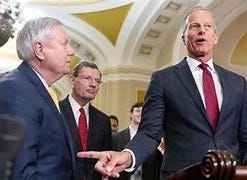Senate Passes Budget, Leaving House Republicans the Only Remaining Roadblock to Deep Spending and Tax Cuts
The U.S. Senate passed spending levels for the federal budget early Saturday. Now it's up to House Republicans. Tax cuts for the rich and 100s of billions in rural funding hang in the balance.
—Jake Davis contributed to this report.
Senate Republicans passed their version of federal spending and tax cuts early Saturday (April 5, 2025) on a 51-48 vote mostly along party lines. The Senate-adopted budget includes billions in domestic spending cuts and a $5.3 trillion (yes, trillion) debt-exploding tax cut package that benefits primarily multi-millionaires and huge corporations. The bill also raises the U.S. debt ceiling by $5 trillion. All Democrats and two Republicans (Maine Senator Susan Collins and Kentucky Senator Rand Paul) voted against the legislation.
The Senate used “budget reconciliation” to pass the bill, needing only a simple majority vote rather than the usual 60-vote threshold in the upper chamber. The numbers in the budget are forecasts projected over the next ten years. Senate Majority Leader John Thune (R-SD) decided to blow up Senate rules by working around the Parliamentarian (a long-time nonpartisan budget specialist) in order to depict a 2017 Trump tax cut extension as “cost-free.” Thune allowed Senate Budget Committee Chair Lindsey Graham (R-SC) to (falsely) determine the bill’s cost. A precedent could be set for allowing highly partisan budget cost determinations in future negotiations due to Thune’s actions.
The ball is now in the House Republicans’ court. They are expected to take up the Senate bill this week. The House has already passed their version of the budget earlier this year, and the bills are significantly different. The previous House-approved budget calls for $2 trillion in spending cuts, $4.5 trillion in tax benefits for the rich, and a $4 trillion debt ceiling increase. With all Democrats likely to oppose the Senate budget, House Republicans will have to decide if they can stomach the Senate’s version. President Donald Trump has urged the House to pass the Senate plan.
There are real questions about whether House Republicans can get it done. At least three budget hawk/Freedom Caucus Republicans have already said they will oppose the Senate bill. If four Republicans vote no—the Republican House majority is a narrow 220-213—there will need to be additional negotiations navigating the combination of spending cuts, tax cuts, and a debt ceiling increase that can pass both chambers and guarantee Trump’s signature.
No matter what happens in the House, budget details will still be a work in progress. These blueprints are numbers only. The nitty-gritty of the spending and tax cuts will be negotiated within relevant House and Senate Committees later this year. $880 billion in Medicaid cuts and $230 billion in SNAP (the Supplemental Nutrition Assistance Program formerly known as food stamps) cuts are on the table. House Agriculture Committee Chair Glenn Thompson (R-PA) also hopes to use the process rather than the Farm Bill debate to increase government payments to rowcrop farmers.
Senate Democrats did offer numerous amendments related to rural people and the rural economy that could have limited the damage done by Republican budget plans. Senator Cory Booker (D-NJ) sought passage of his bill binding the U.S. Department of Agriculture (USDA) to honor existing farm and rural contracts for conservation, local food, and clean energy funding. Senator Martin Heinrich (D-NM) offered an amendment to bar the Interior Department and U.S. Forest Service from selling off public lands. Numerous amendments to protect rural health care, low-income utility support, fighting wildfires, and maintain federal jobs were proposed, as were amendments to protect SNAP, school lunch and breakfast, and emergency food programs. All of these Amendments were ultimately rejected by Republicans, though a handful of GOP Senators joined Democrats on certain Amendment votes.
Final budget numbers will determine much about the state of the rural economy in years to come. Hundreds of billions of dollars are at stake. Many, many questions remain for House and Senate budget negotiators, such as:
How will deep SNAP cuts impact rural people, jobs, rural grocers, public health, and the broader rural economy?
How will domestic spending cuts impact previous funding promises to build out more rural high-speed internet?
Will funding for rural water, sewage, electricity, low-income housing, and transportation infrastructure face deep cuts?
Will farmers be able access high-demand conservation and local food funding?
Will the rural clean energy boom continue as funding and incentives are cut?
Are public land managers able to handle fighting wildfires, forest and grassland management, leasing and permitting additional drilling and mining mandates, and growing outdoor recreation demands as Trump fires federal workers?
One thing is clear: rural America is facing steep funding declines that support rural jobs, health care, public services, education, conservation, and more. And Republicans are responsible for the economic damage to come, all in service of achieving their ultimate goal of cutting taxes for a handful of the richest Americans and the corporations they own.
The Cocklebur covers rural policy and politics from a progressive point-of-view. Our work focuses on a tangled rural political reality of dishonest debate, economic and racial disparities, corporate power over our democracy, and disinformation peddled by conservative media outlets. We aim to use facts, data, and science to inform our point-of-view. We wear our complicated love/WTF relationship with rural America on our sleeve.





